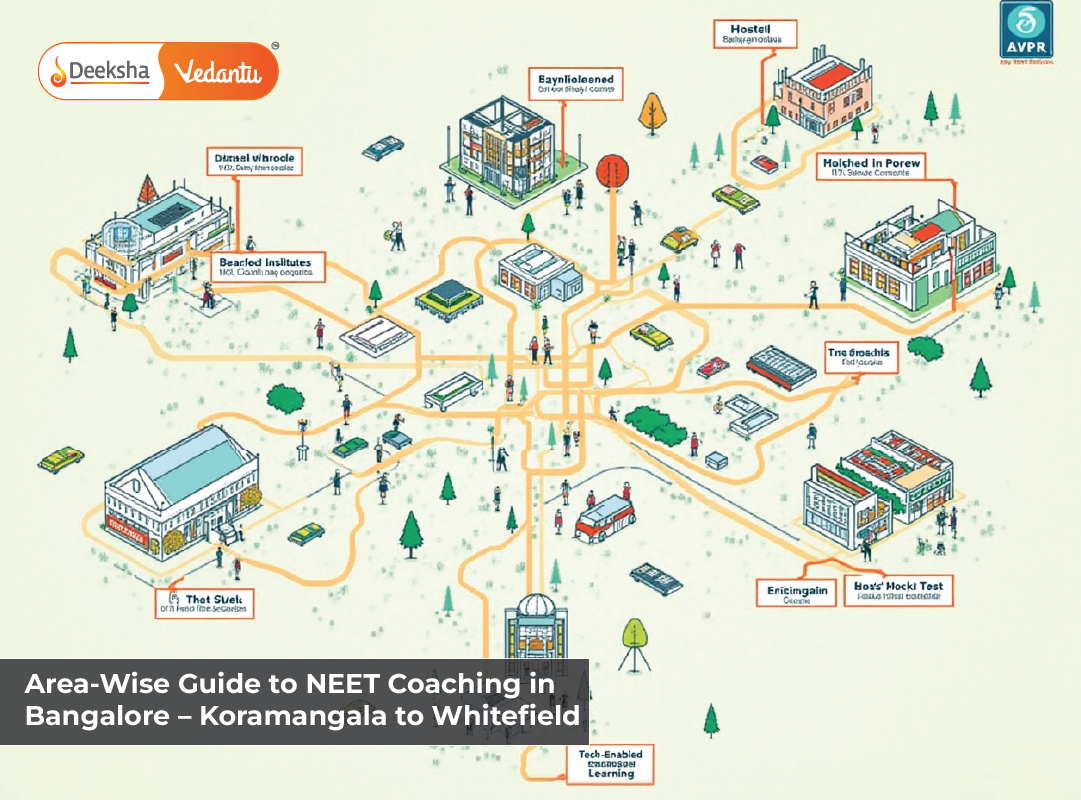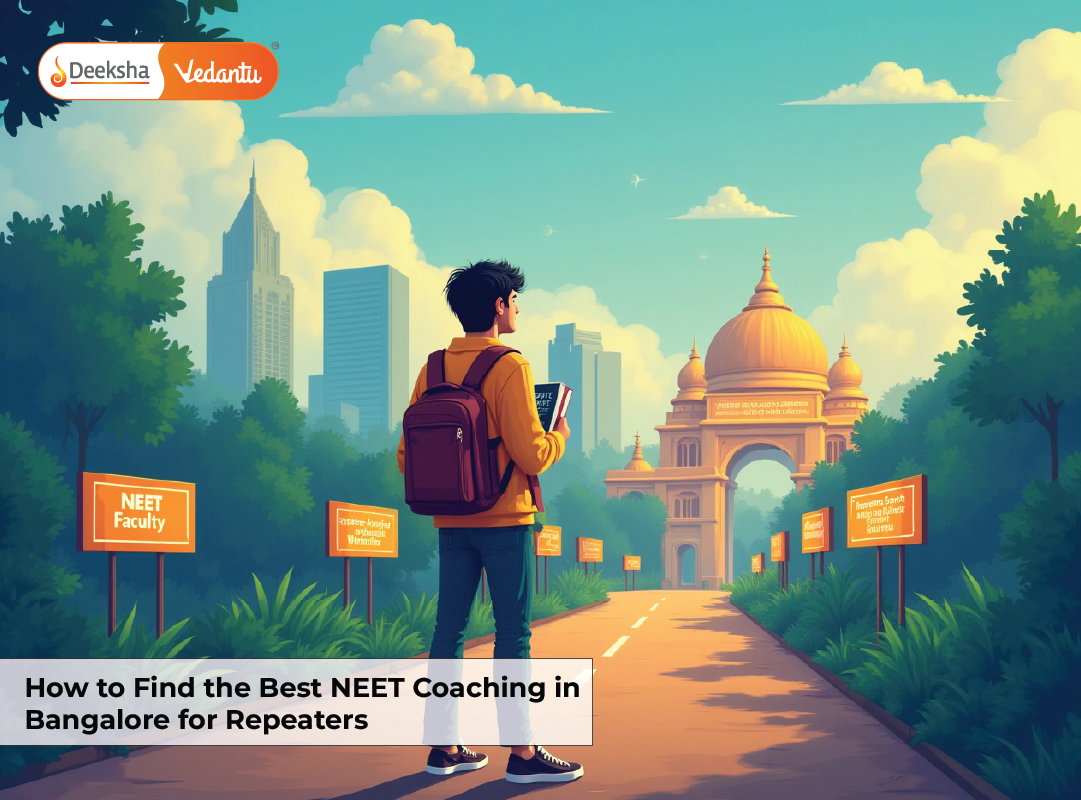Introduction
Choosing the right preparation method for NEET can shape not only your learning journey but also your confidence and eventual outcome. With over 20 lakh aspirants competing for a limited number of medical seats, making the right decision early can be the difference between securing your dream college or trying again next year.
Should you join one of the best NEET coaching institutes in your city or online? Or should you rely on your own discipline, resources, and plan to self-study at home? Each approach has its strengths—and potential drawbacks. It all depends on your learning style, resources, personal motivation, and goals.
At Deeksha Vedantu, we work with students across India—some with access to top coaching programs, others excelling through self-study—and we know one size does not fit all. In this blog, we break down both approaches in detail to help you choose what truly works for you.
Explore Deeksha Vedantu Long Term NEET Coaching to boost your NEET Scores today.
Understanding the NEET Exam
Before diving into preparation methods, it’s essential to understand what NEET demands from students:
- Exam Name: National Eligibility cum Entrance Test (Undergraduate)
- Conducting Body: NTA (National Testing Agency)
- Subjects Covered: Physics, Chemistry, Biology (Botany & Zoology)
- Question Format: 200 MCQs (180 to be attempted)
- Exam Duration: 3 hours and 20 minutes
- Marking Scheme: +4 marks for correct answers, -1 for wrong answers
The exam emphasizes clarity of concepts, speed, accuracy, and time management. With a vast syllabus and increasing competition, your preparation strategy must be efficient and personalized.
NEET Coaching: A Structured Approach
Coaching for NEET, whether online or offline, provides guided mentorship from subject experts, peer interaction, structured timetables, and regular testing—all within a defined curriculum. Leading institutes also provide rank analysis, AI-based test reports, and doubt-clearing sessions.
Advantages of NEET Coaching
- Expert Guidance: Faculties bring years of teaching experience, helping simplify complex concepts.
- Regular Evaluation: Weekly tests, grand tests, and performance analysis help track progress.
- Structured Schedules: Pre-designed lesson plans and timetables ensure full syllabus coverage.
- Access to Competitive Environment: Studying with other motivated peers can enhance performance.
- Comprehensive Study Materials: High-quality books, assignments, and test papers.
Disadvantages of NEET Coaching
- High Fees: Coaching costs can run into lakhs, not feasible for every family.
- Time Constraints: Long classroom hours leave limited time for self-revision.
- Travel Issues: Commute time, especially in metro cities, adds fatigue.
- Lack of Personalization: Uniform pace may not suit fast or slow learners.
Self-Study: A Flexible and Personal Path
Self-study empowers students to take full control of their learning process. With abundant free and paid resources available today—such as NCERT books, YouTube lectures, doubt-solving apps, and mock tests—self-study is a viable option for many NEET aspirants.
Advantages of Self-Study
- Customizable Learning: Tailor your study plans to your strengths, weaknesses, and productivity hours.
- Cost-Effective: Avoid the burden of coaching fees.
- Time Saving: No commuting, fixed breaks, or waiting on classes.
- Independence: Encourages problem-solving, accountability, and critical thinking.
Disadvantages of Self-Study
- No Formal Mentorship: Students must actively seek help through online forums or peers.
- Risk of Procrastination: Without fixed schedules, motivation may drop over time.
- Limited Exposure to Competition: Peer comparison and benchmarking opportunities may be missing.
- Lack of Structured Feedback: Mistake analysis may not be as thorough without expert input.
NEET Coaching vs. Self-Study: Head-to-Head Comparison
| Factor | NEET Coaching | Self-Study |
| Cost | High | Low |
| Flexibility | Limited | High |
| Doubt Solving | On-demand (mentors) | Self-driven / online forums |
| Time Management | Fixed schedule | Self-managed |
| Competition Awareness | High (peers/tests) | Low (unless supplemented) |
| Learning Pace | Standardized | Personalized |
| Motivation | Driven by external system | Requires strong internal discipline |
| Success Rate | Higher for average learners | Higher for disciplined, independent learners |
Who Should Choose NEET Coaching?
- Students who need structured routines and regular motivation
- Learners who prefer learning from teachers directly
- Those who perform better in competitive environments
- Candidates who struggle with planning, revision, and consistency
- Students in Tier 2/Tier 3 cities with limited local resources but access to online coaching
Who Should Choose Self-Study?
- Highly motivated students with strong academic foundations
- Those who enjoy independent learning and managing their time
- Students balancing school and NEET prep simultaneously
- Learners with access to good books, reliable video lectures, and online test platforms
- Students who cannot afford formal coaching but are determined to crack NEET
Hybrid Approach: Combining the Best of Both
Today, many aspirants follow a hybrid approach—using coaching for structured guidance while supplementing with self-study for deeper understanding.
How a Hybrid Model Works:
- Use coaching (online/offline) for Physics and Organic Chemistry, self-study for Biology
- Follow recorded video lectures but revise through NCERT-based handwritten notes
- Practice MCQs through apps like Deeksha Vedantu while solving previous year papers independently
Benefits:
- Flexible and cost-effective
- Reduces dependency on coaching for every subject
- Allows personalized schedules with external support
Tips for Successful Self-Study
- Make a study timetable and stick to it religiously
- Use NCERT as the primary textbook, supplemented by reference books
- Practice 150–200 MCQs daily
- Revise regularly using formula sheets, flashcards, and summary notes
- Attempt 1–2 full-length mock tests every week
- Use error logs to track recurring mistakes and correct them
- Engage in discussion forums and doubt-clearing communities
Tips for Maximizing Coaching Benefits
- Stay ahead by previewing topics before they’re taught
- Ask doubts in class and actively participate
- Avoid depending solely on coaching; supplement with NCERT
- Take every test seriously and analyze results thoroughly
- Avoid comparison with others; focus on self-improvement
FAQs
Can I crack NEET without coaching?
Yes. Thousands of NEET toppers have succeeded through self-study, provided they follow a disciplined and strategic approach.
Is online coaching as effective as offline?
For many students, yes. Online coaching offers flexibility, recorded sessions, and doubt forums that are accessible anytime.
What are the most important self-study tools?
NCERT books, previous year questions, reliable online lectures, mock test platforms, and summary notes.
How do I stay consistent during self-study?
Set daily goals, maintain a progress tracker, take breaks, and revisit your motivations regularly.
Can I combine coaching with self-study?
Absolutely. This hybrid model is one of the most efficient methods if executed properly.
Check out our NEET Residential Coaching option for focused preparation.
Conclusion
There’s no universal formula for NEET success. Whether you thrive in coaching classes or prefer the independence of self-study, your consistency, clarity, and commitment are what count. Both methods can work—when aligned with your learning style, resources, and goals.
At Deeksha Vedantu, we support both coaching and self-study models with flexible learning options, doubt-clearing platforms, test series, and study resources designed to suit every type of learner.
Table of Contents















Get Social